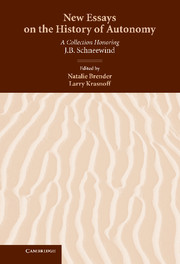7 - What Is Disorientation in Thinking?
from PART TWO - AUTONOMY IN PRACTICE
Published online by Cambridge University Press: 24 July 2009
Summary
In the final chapters of The Invention of Autonomy, J. B. Schneewind argues for a twofold interpretive approach to Kant's philosophical project. Firstly, he holds, we must grasp Kant's understanding of himself as a philosopher seeking to illuminate eternal moral truths and thereby to advance humanity's progress toward rationality and enlightenment. Yet even as we pursue this ‘internalist’ insight into Kant's philosophical presuppositions and intentions, we cannot expect to share them; for pace Kant, there are no historically and culturally timeless human truths susceptible to philosophical articulation. Because our self-understanding is always bound up with the discourse of particular cultures, any conceptualization of morality is tied to the historical and cultural context of its articulation. As Schneewind puts it, in “moral, political, and religious aspects of life. … [W]e can only be what we can think and say we are.”
If an extrahistorical and extracultural ‘view from nowhere’ is impossible, then Kant's understanding of moral philosophy and its development cannot be correct. Instead, according to Schneewind, philosophy should be regarded both as a cultural product and as one of the constitutive sources of a culture's conceptual vocabulary and self-understanding. To study the philosophy of a particular period with due attention to its sociohistorical context is to learn what cultural agendas it reflects and promotes. This approach sees a philosopher's work as applying conceptual reformulations to social, political and religious problems of his or her era.
- Type
- Chapter
- Information
- New Essays on the History of AutonomyA Collection Honoring J. B. Schneewind, pp. 154 - 180Publisher: Cambridge University PressPrint publication year: 2004
- 1
- Cited by

